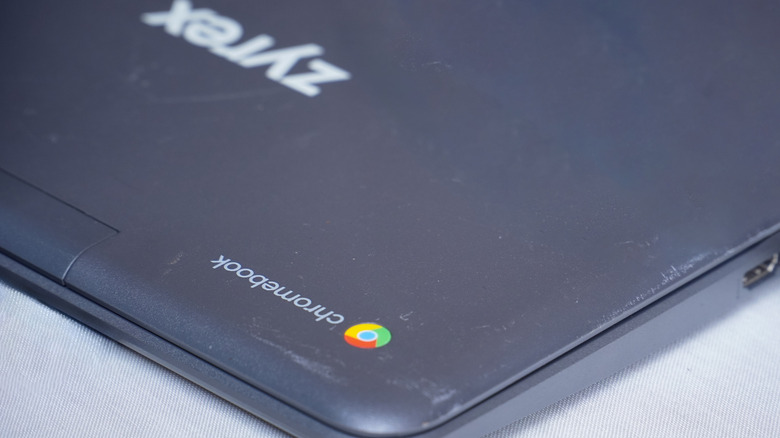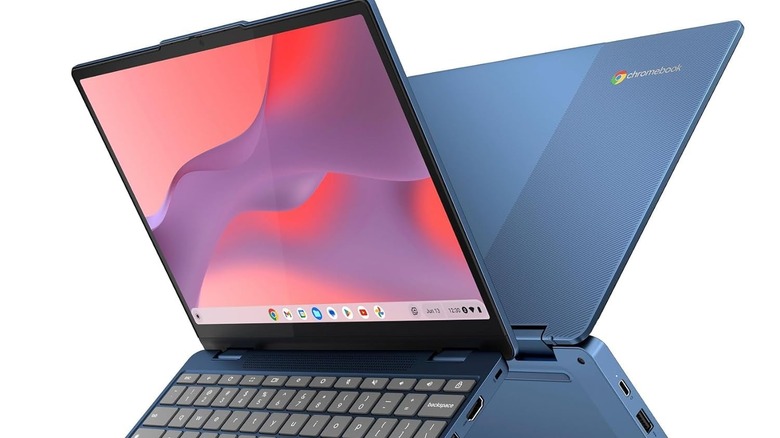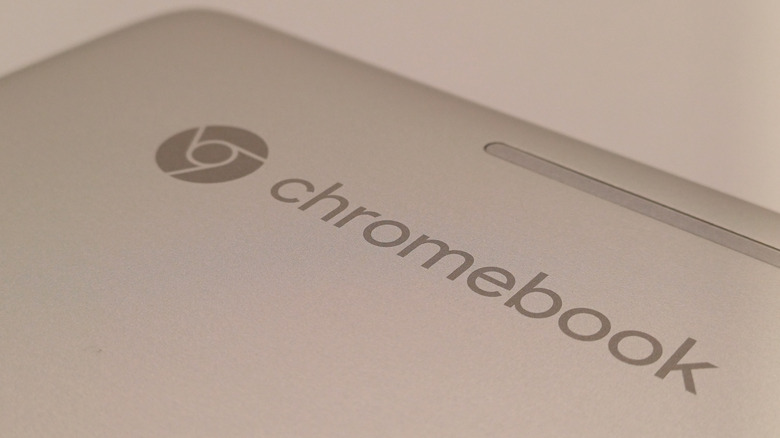What's The Average Lifespan Of A Chromebook, And Are There Ways To Extend It?
We may receive a commission on purchases made from links.
Chromebooks might lack the bells and whistles of a MacBook Pro. But that's not to say that it's a mediocre laptop by any means. In fact, if you're a remote worker who lives in Google Docs, a Chromebook might be a good option. It's lightweight and has a capable operating system that makes it easy to use and fast. Plus, it's one of the most affordable laptops for college students, with models like the Lenovo Flex 3i Chromebook retailing for less than $400 on Amazon.
Unfortunately, its greatest strength — affordability — is also its greatest weakness. When you buy a MacBook Pro, you can expect to spend well over $1,500. And while the price might be quite high, you can rest assured that in most cases it will serve you for nearly a decade. On the other hand, you might spend just a few hundred dollars on a Chromebook, and before you know it, it starts to feel outdated. Going through this experience can leave you wondering: How long should a Chromebook last?
The precise answer to that is there's no specific number, as it all comes down to a series of factors. As a rule of thumb, a Chromebook should last at least ten years (from when it was first released, not when you bought it), mainly because of Google's update policy. After that, it might still "work" but become less secure as it will not receive any security updates. However, if you're quite diligent with how you treat your laptop and have luck on your side, it might even last longer.
How long should your Chromebook last (and signs it's nearing its end)
Unlike traditional Windows laptops, the biggest factor that affects the lifespan of Chromebooks isn't the hardware; it's Google's update policy. In fact, one of the main reasons you might think twice about buying a Chromebook is that it comes with an expiration date. When it comes to Google Chromebooks, each model has an Auto Update Expiration (AUE) date — usually ten years after its release. However, Chromebooks released before 2021 may have a shorter support window. This means that once your laptop hits that point, it will stop receiving automatic updates, new features, and security updates. Of course, when you turn your machine on, it will still work. But without those updates, it will become less compatible with newer apps. Plus, it'll be vulnerable to malware and data theft, and even worse, it may experience impaired performance and stability issues.
Luckily, checking your Chromebook's AUE is quite simple. On your laptop, go to Settings > About ChromeOS > Additional Details, and you'll see the exact year and month when your Chromebook will expire. But you don't have to wait until your laptop's official AUE date to take action. Sometimes, it'll be in your best interest to check for signs that your Chromebook is approaching the end of its life. Think of slower startup times, frequent crashes once you open many tabs, and battery health. This way, you'll have a better sense of when it's time to start planning an upgrade — or to search for various ways to extend your Chromebook's lifespan.
How to extend the lifespan of your Chromebook
If your Chromebook has reached its AUE date, that doesn't mean you should give up on it yet. The good news is that there are several things you can do to give your old Chromebook an upgrade. A big part of that comes down to how you treat your machine. Chromebooks are cloud-based devices. That means that it can feel somewhat limiting when it comes to storage space, as downloads and offline files can pile up over time. For this reason, you'll want to free up the space by deleting old files. You can even opt to expand its storage capacity by utilizing a microSD card to save data.
Besides its storage, it's also vital that you take good care of its battery. Leaving your laptop plugged in around the clock might seem harmless at a glance. But you should know laptops run on lithium batteries; if subjected to constant strain, they will wear out faster. Additionally, you'll want to keep your Chromebook clean and dust-free. It's also a great idea to store it in a case or a padded sleeve when traveling. After all, you don't want your device to have a dented hinge or a cracked screen; it can shorten its life much faster than any software deadline.


